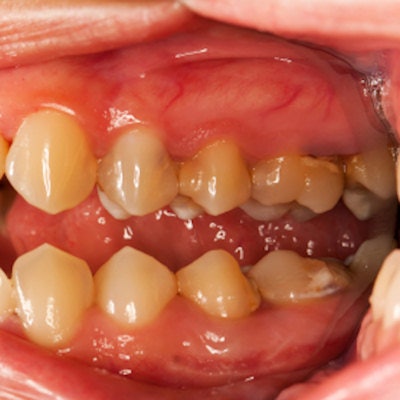
Interest in the link between periodontal health and systemic disease has been growing, with researchers investigating possible connections between oral health and diseases including artherosclerosis, diabetes, pregnancy outcomes, and respiratory conditions. But what has recent research found?
To assess newer results, investigators conducted a review of randomized trials performed since 2010 that examined the effects of periodontal treatment on systemic disease. They found evidence that periodontal treatment can reduce the risks of certain diseases and conditions. Their review was published in the journal Periodontology 2000 on September 9.
"There are very few patients for whom treatment of periodontal disease would be detrimental," co-author Frank Scannapieco, PhD, DMD, told DrBicuspid.com. "It is possible that periodontal treatment could reduce the risk for other diseases, including diabetes and respiratory disease."
Dr. Scannapieco is a professor and the chair of oral biology at the University of Buffalo School of Dental Medicine in New York.
Not a cure-all
In 2010, Dr. Scannapieco published a review that found little evidence from published clinical trials that periodontal therapy affected systemic disease status. He and his colleagues conducted the current review to determine if any progress had been made since then.
“There are very few patients for whom treatment of periodontal disease would be detrimental.”
They assessed randomized studies conducted from January 2010 through April 2016 that examined the relationship between periodontal treatment and systemic diseases and conditions.
They searched multiple databases for randomized controlled trials that looked at least one systemic outcome in participants of any age who received periodontal therapy and included 59 articles in their review.
The researchers found at least one clinical trial that tested the effects of periodontal intervention for the following chronic diseases and conditions:
- Adverse pregnancy outcomes
- Diabetes
- Pneumonia
- Chronic obstructive pulmonary disease
This included eight randomized clinical trials that focused on the effects of nonsurgical periodontal intervention on adverse pregnancy outcomes. They found that the treatment was safe and effective for improving periodontal status in pregnant women.
"However, data from low-bias studies before 2010 and the randomized clinical trials evaluated in the present review suggest no beneficial effect of nonsurgical periodontal treatment on adverse pregnancy outcomes," the review authors wrote.
At the same time, other studies do suggest a possible relationship between maternal-fetal health and periodontal disease severity, they noted.
The researchers further examined 23 randomized clinical trials published since 2010 that evaluated the effects of oral interventions on glycemic control. Four of these studies looked at the effects of surgical or nonsurgical periodontal treatment, including the use of antibiotics, on individuals with type 2 diabetes, and 18 studies assessed the effects of nonsurgical periodontal treatments alone on glycated hemoglobin/glycemic control in this population.
The use of antibiotics did not affect periodontal clinical parameters, the authors found. However, a study on full-mouth extraction of remaining hopeless teeth found that the intervention improved glycemic control, and the majority but not all of the clinical trials suggested that periodontal treatment improved glycemic control among patients with type 2 diabetes.
Overall, the results supported a modest improvement in glycemic control with the use of nonsurgical periodontal treatment in patients with type 2 diabetes and periodontitis.
In the area of respiratory diseases, the authors identified nine studies on the use of oral interventions for preventing pneumonia in high-risk patients. Among those, five tested chlorhexidine, one examined povidone iodine, one studied toothbrushing, and two investigated a multicomponent strategy.
Both earlier and newer results supported the use of chlorhexidine for reducing the incidence of pneumonia in intensive care settings. However, not all studies found oral care effective for preventing respiratory infection in high-risk institutional settings.
Study results indicated that reducing plaque biofilms appeared to reduce the risk of pneumonia in high-risk patients and exacerbation of chronic obstructive pulmonary disease, according to the review authors.
"Most of the findings were as expected," Dr. Scannapieco told DrBicuspid.com of the review's overall results. "It was interesting to note that modest improvements in glycemic control appear to result from nonsurgical periodontal therapy in individuals with type 2 diabetes mellitus and periodontitis, and that bacteria originating from the oral cavity cause pneumonia and may contribute to exacerbations in patients with chronic obstructive pulmonary disease."
Multifactorial etiologies
While epidemiologic and mechanistic studies have found evidence of the connections between poor oral health, particularly periodontitis, and numerous complex systemic diseases and conditions, various factors limited the results of studies at demonstrating that periodontal treatment prevents systemic disease outcomes:
- Studies of pregnancy outcomes provided care during pregnancy rather than before conception.
- Common complex diseases have multifactorial etiologies that cannot be fully explained by specific microbe-host interactions.
- The range of levels of glycated hemoglobin among study participants with diabetes varied, and follow-up periods were too short for evaluating glycemic control in some cases.
For now, the review authors are studying the effects of oral health on hospitalization in nursing home residents and dental health on the risk of community-acquired pneumonia.
"There is little evidence from clinical trials that periodontal intervention will prevent the initiation and/or progression of common complex diseases and conditions other than adverse pregnancy outcomes, diabetes, pneumonia, and chronic obstructive pulmonary disease," they concluded.



















